BMP6003 - IHRM: Cultural & HRM Issues for UK Call Centre in Japan
VerifiedAdded on 2023/06/17
|9
|3273
|163
Report
AI Summary
This report critically evaluates the cultural and HRM issues that UK companies need to consider when establishing a call center operation in Japan. It explores the importance of understanding Japanese culture, including material culture, cultural preferences, language, religion, education, ethics, social organization and values. The report also addresses key HRM challenges such as talent acquisition, developing agile leaders, ensuring compliance with labor laws, efficient coordination, balancing local and home issues, knowledge sharing, retaining critical talent, improving productivity, operating efficiently, and building capability. Furthermore, the report outlines the benefits of international expansion, including access to new markets, competitive advantage, a larger customer pool, access to local talent, increased profit potential, government incentives, and cost savings. This comprehensive analysis provides valuable insights for businesses seeking to expand their operations into the Japanese market.
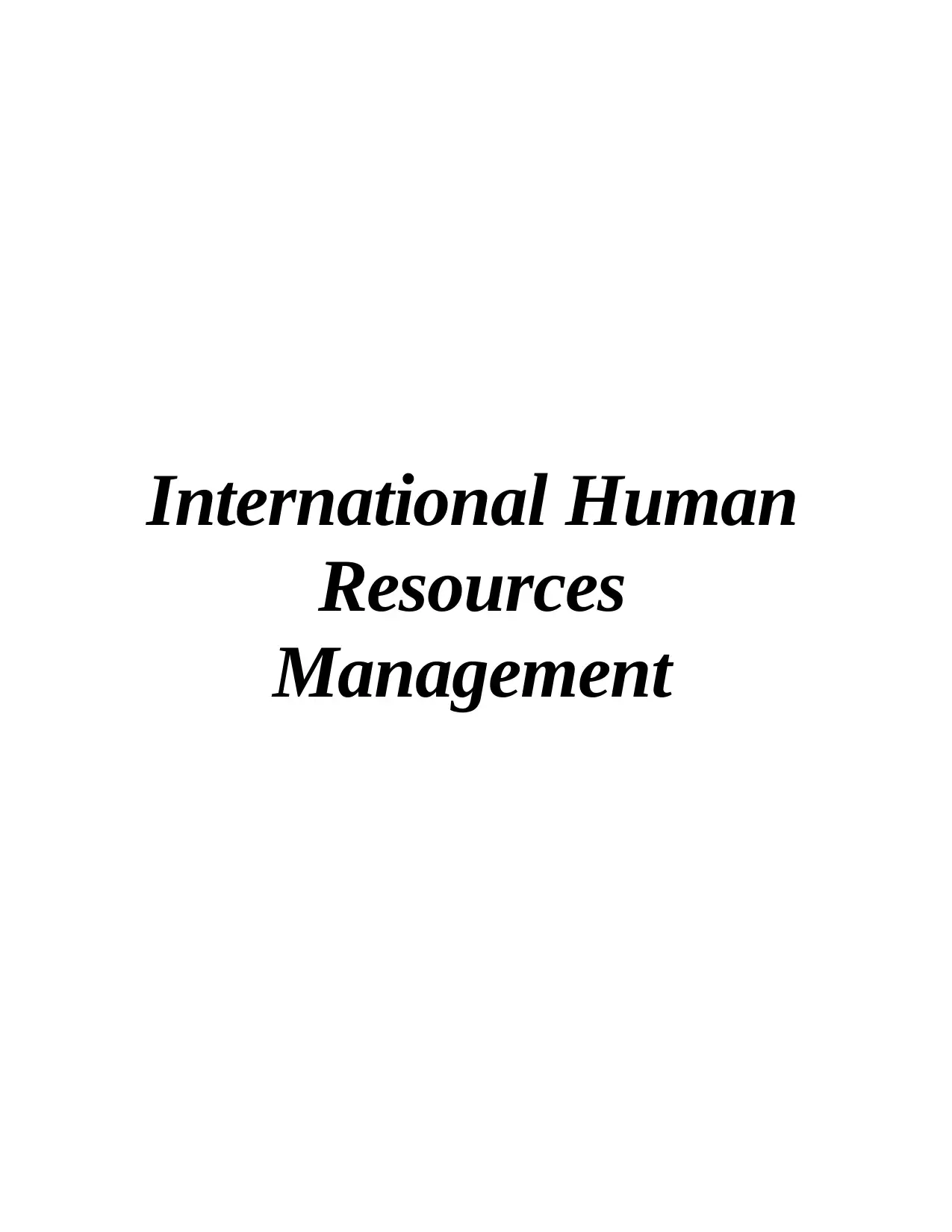
International Human
Resources
Management
Resources
Management
Paraphrase This Document
Need a fresh take? Get an instant paraphrase of this document with our AI Paraphraser
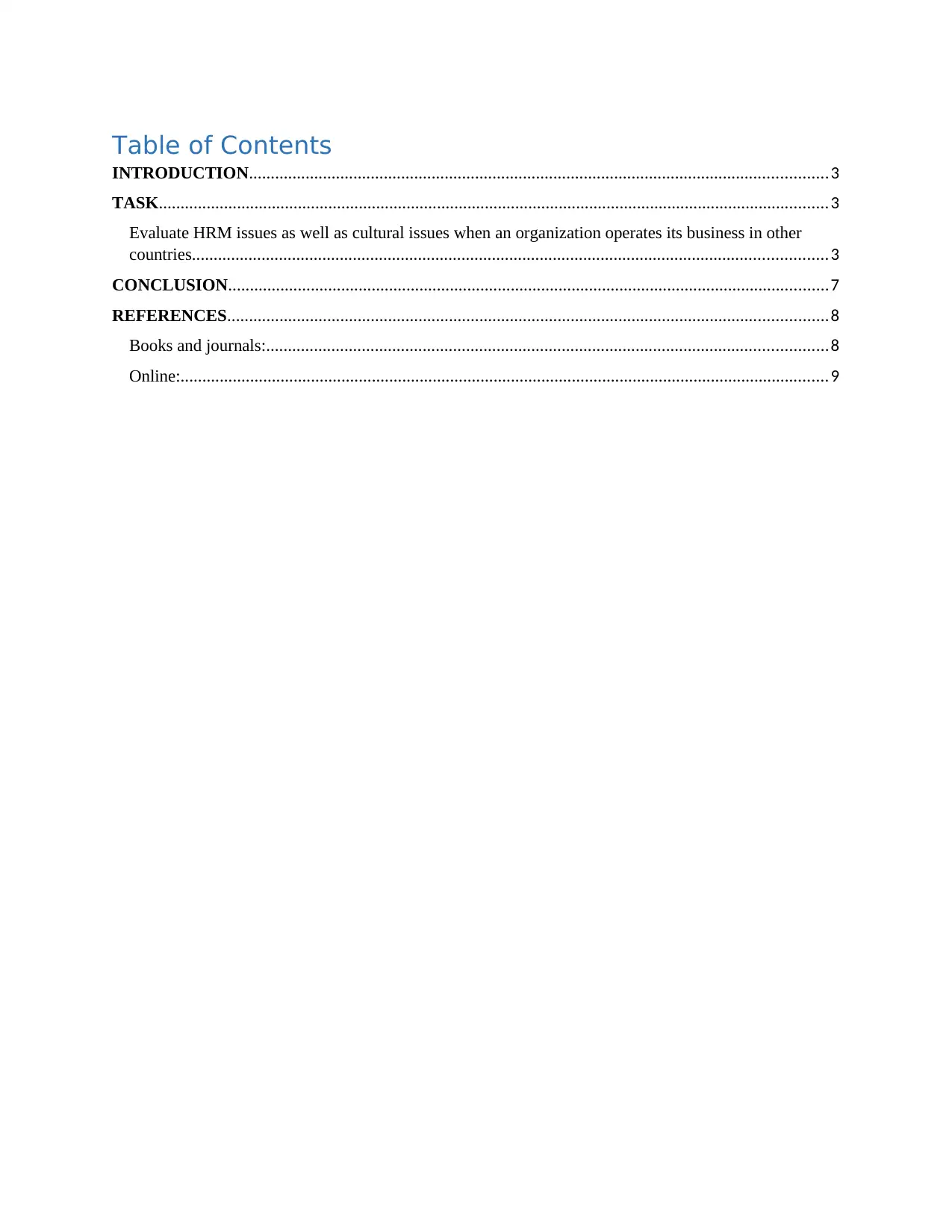
Table of Contents
INTRODUCTION.....................................................................................................................................3
TASK..........................................................................................................................................................3
Evaluate HRM issues as well as cultural issues when an organization operates its business in other
countries..................................................................................................................................................3
CONCLUSION..........................................................................................................................................7
REFERENCES..........................................................................................................................................8
Books and journals:.................................................................................................................................8
Online:.....................................................................................................................................................9
INTRODUCTION.....................................................................................................................................3
TASK..........................................................................................................................................................3
Evaluate HRM issues as well as cultural issues when an organization operates its business in other
countries..................................................................................................................................................3
CONCLUSION..........................................................................................................................................7
REFERENCES..........................................................................................................................................8
Books and journals:.................................................................................................................................8
Online:.....................................................................................................................................................9
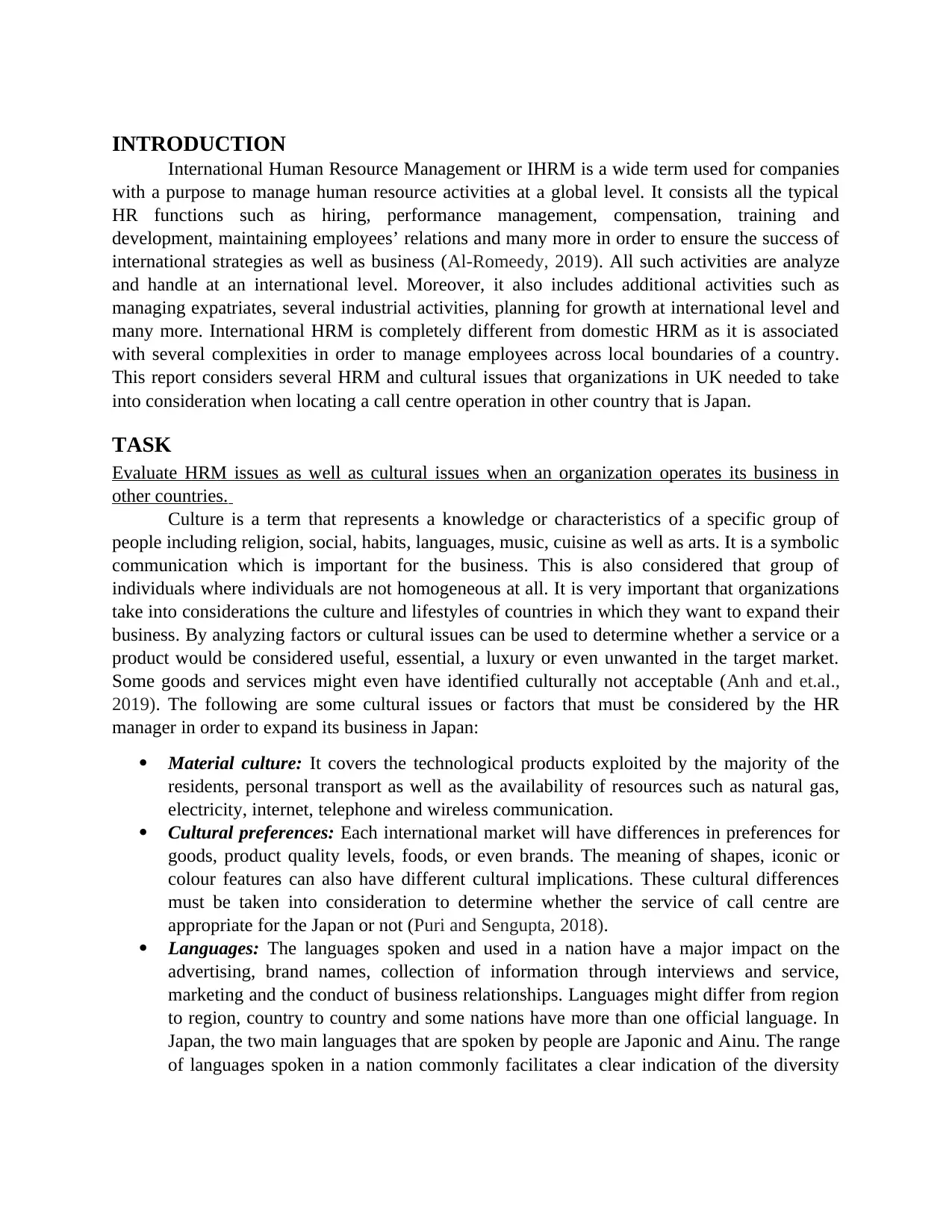
INTRODUCTION
International Human Resource Management or IHRM is a wide term used for companies
with a purpose to manage human resource activities at a global level. It consists all the typical
HR functions such as hiring, performance management, compensation, training and
development, maintaining employees’ relations and many more in order to ensure the success of
international strategies as well as business (Al-Romeedy, 2019). All such activities are analyze
and handle at an international level. Moreover, it also includes additional activities such as
managing expatriates, several industrial activities, planning for growth at international level and
many more. International HRM is completely different from domestic HRM as it is associated
with several complexities in order to manage employees across local boundaries of a country.
This report considers several HRM and cultural issues that organizations in UK needed to take
into consideration when locating a call centre operation in other country that is Japan.
TASK
Evaluate HRM issues as well as cultural issues when an organization operates its business in
other countries.
Culture is a term that represents a knowledge or characteristics of a specific group of
people including religion, social, habits, languages, music, cuisine as well as arts. It is a symbolic
communication which is important for the business. This is also considered that group of
individuals where individuals are not homogeneous at all. It is very important that organizations
take into considerations the culture and lifestyles of countries in which they want to expand their
business. By analyzing factors or cultural issues can be used to determine whether a service or a
product would be considered useful, essential, a luxury or even unwanted in the target market.
Some goods and services might even have identified culturally not acceptable (Anh and et.al.,
2019). The following are some cultural issues or factors that must be considered by the HR
manager in order to expand its business in Japan:
Material culture: It covers the technological products exploited by the majority of the
residents, personal transport as well as the availability of resources such as natural gas,
electricity, internet, telephone and wireless communication.
Cultural preferences: Each international market will have differences in preferences for
goods, product quality levels, foods, or even brands. The meaning of shapes, iconic or
colour features can also have different cultural implications. These cultural differences
must be taken into consideration to determine whether the service of call centre are
appropriate for the Japan or not (Puri and Sengupta, 2018).
Languages: The languages spoken and used in a nation have a major impact on the
advertising, brand names, collection of information through interviews and service,
marketing and the conduct of business relationships. Languages might differ from region
to region, country to country and some nations have more than one official language. In
Japan, the two main languages that are spoken by people are Japonic and Ainu. The range
of languages spoken in a nation commonly facilitates a clear indication of the diversity
International Human Resource Management or IHRM is a wide term used for companies
with a purpose to manage human resource activities at a global level. It consists all the typical
HR functions such as hiring, performance management, compensation, training and
development, maintaining employees’ relations and many more in order to ensure the success of
international strategies as well as business (Al-Romeedy, 2019). All such activities are analyze
and handle at an international level. Moreover, it also includes additional activities such as
managing expatriates, several industrial activities, planning for growth at international level and
many more. International HRM is completely different from domestic HRM as it is associated
with several complexities in order to manage employees across local boundaries of a country.
This report considers several HRM and cultural issues that organizations in UK needed to take
into consideration when locating a call centre operation in other country that is Japan.
TASK
Evaluate HRM issues as well as cultural issues when an organization operates its business in
other countries.
Culture is a term that represents a knowledge or characteristics of a specific group of
people including religion, social, habits, languages, music, cuisine as well as arts. It is a symbolic
communication which is important for the business. This is also considered that group of
individuals where individuals are not homogeneous at all. It is very important that organizations
take into considerations the culture and lifestyles of countries in which they want to expand their
business. By analyzing factors or cultural issues can be used to determine whether a service or a
product would be considered useful, essential, a luxury or even unwanted in the target market.
Some goods and services might even have identified culturally not acceptable (Anh and et.al.,
2019). The following are some cultural issues or factors that must be considered by the HR
manager in order to expand its business in Japan:
Material culture: It covers the technological products exploited by the majority of the
residents, personal transport as well as the availability of resources such as natural gas,
electricity, internet, telephone and wireless communication.
Cultural preferences: Each international market will have differences in preferences for
goods, product quality levels, foods, or even brands. The meaning of shapes, iconic or
colour features can also have different cultural implications. These cultural differences
must be taken into consideration to determine whether the service of call centre are
appropriate for the Japan or not (Puri and Sengupta, 2018).
Languages: The languages spoken and used in a nation have a major impact on the
advertising, brand names, collection of information through interviews and service,
marketing and the conduct of business relationships. Languages might differ from region
to region, country to country and some nations have more than one official language. In
Japan, the two main languages that are spoken by people are Japonic and Ainu. The range
of languages spoken in a nation commonly facilitates a clear indication of the diversity
⊘ This is a preview!⊘
Do you want full access?
Subscribe today to unlock all pages.

Trusted by 1+ million students worldwide
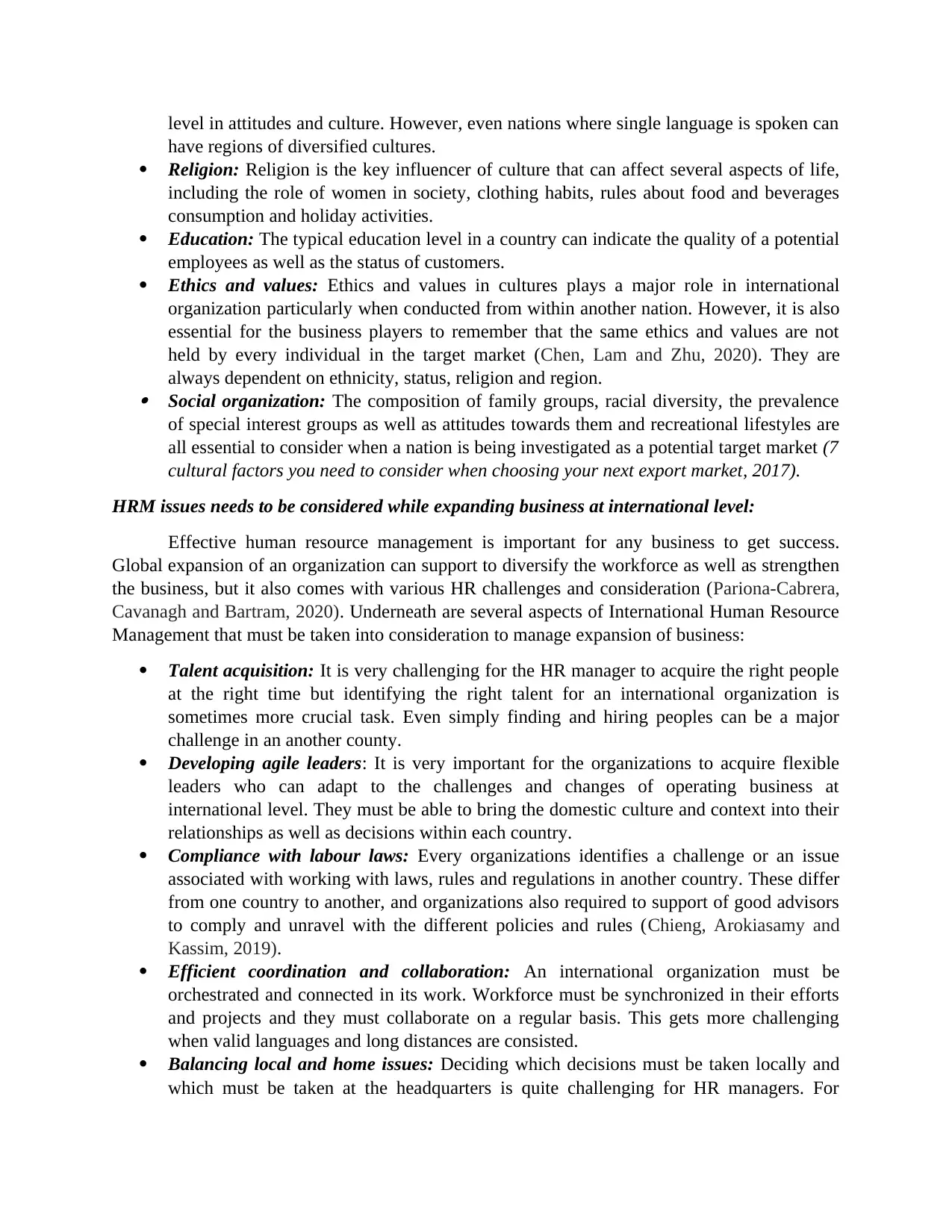
level in attitudes and culture. However, even nations where single language is spoken can
have regions of diversified cultures.
Religion: Religion is the key influencer of culture that can affect several aspects of life,
including the role of women in society, clothing habits, rules about food and beverages
consumption and holiday activities.
Education: The typical education level in a country can indicate the quality of a potential
employees as well as the status of customers.
Ethics and values: Ethics and values in cultures plays a major role in international
organization particularly when conducted from within another nation. However, it is also
essential for the business players to remember that the same ethics and values are not
held by every individual in the target market (Chen, Lam and Zhu, 2020). They are
always dependent on ethnicity, status, religion and region.
Social organization: The composition of family groups, racial diversity, the prevalence
of special interest groups as well as attitudes towards them and recreational lifestyles are
all essential to consider when a nation is being investigated as a potential target market (7
cultural factors you need to consider when choosing your next export market, 2017).
HRM issues needs to be considered while expanding business at international level:
Effective human resource management is important for any business to get success.
Global expansion of an organization can support to diversify the workforce as well as strengthen
the business, but it also comes with various HR challenges and consideration (Pariona‐Cabrera,
Cavanagh and Bartram, 2020). Underneath are several aspects of International Human Resource
Management that must be taken into consideration to manage expansion of business:
Talent acquisition: It is very challenging for the HR manager to acquire the right people
at the right time but identifying the right talent for an international organization is
sometimes more crucial task. Even simply finding and hiring peoples can be a major
challenge in an another county.
Developing agile leaders: It is very important for the organizations to acquire flexible
leaders who can adapt to the challenges and changes of operating business at
international level. They must be able to bring the domestic culture and context into their
relationships as well as decisions within each country.
Compliance with labour laws: Every organizations identifies a challenge or an issue
associated with working with laws, rules and regulations in another country. These differ
from one country to another, and organizations also required to support of good advisors
to comply and unravel with the different policies and rules (Chieng, Arokiasamy and
Kassim, 2019).
Efficient coordination and collaboration: An international organization must be
orchestrated and connected in its work. Workforce must be synchronized in their efforts
and projects and they must collaborate on a regular basis. This gets more challenging
when valid languages and long distances are consisted.
Balancing local and home issues: Deciding which decisions must be taken locally and
which must be taken at the headquarters is quite challenging for HR managers. For
have regions of diversified cultures.
Religion: Religion is the key influencer of culture that can affect several aspects of life,
including the role of women in society, clothing habits, rules about food and beverages
consumption and holiday activities.
Education: The typical education level in a country can indicate the quality of a potential
employees as well as the status of customers.
Ethics and values: Ethics and values in cultures plays a major role in international
organization particularly when conducted from within another nation. However, it is also
essential for the business players to remember that the same ethics and values are not
held by every individual in the target market (Chen, Lam and Zhu, 2020). They are
always dependent on ethnicity, status, religion and region.
Social organization: The composition of family groups, racial diversity, the prevalence
of special interest groups as well as attitudes towards them and recreational lifestyles are
all essential to consider when a nation is being investigated as a potential target market (7
cultural factors you need to consider when choosing your next export market, 2017).
HRM issues needs to be considered while expanding business at international level:
Effective human resource management is important for any business to get success.
Global expansion of an organization can support to diversify the workforce as well as strengthen
the business, but it also comes with various HR challenges and consideration (Pariona‐Cabrera,
Cavanagh and Bartram, 2020). Underneath are several aspects of International Human Resource
Management that must be taken into consideration to manage expansion of business:
Talent acquisition: It is very challenging for the HR manager to acquire the right people
at the right time but identifying the right talent for an international organization is
sometimes more crucial task. Even simply finding and hiring peoples can be a major
challenge in an another county.
Developing agile leaders: It is very important for the organizations to acquire flexible
leaders who can adapt to the challenges and changes of operating business at
international level. They must be able to bring the domestic culture and context into their
relationships as well as decisions within each country.
Compliance with labour laws: Every organizations identifies a challenge or an issue
associated with working with laws, rules and regulations in another country. These differ
from one country to another, and organizations also required to support of good advisors
to comply and unravel with the different policies and rules (Chieng, Arokiasamy and
Kassim, 2019).
Efficient coordination and collaboration: An international organization must be
orchestrated and connected in its work. Workforce must be synchronized in their efforts
and projects and they must collaborate on a regular basis. This gets more challenging
when valid languages and long distances are consisted.
Balancing local and home issues: Deciding which decisions must be taken locally and
which must be taken at the headquarters is quite challenging for HR managers. For
Paraphrase This Document
Need a fresh take? Get an instant paraphrase of this document with our AI Paraphraser
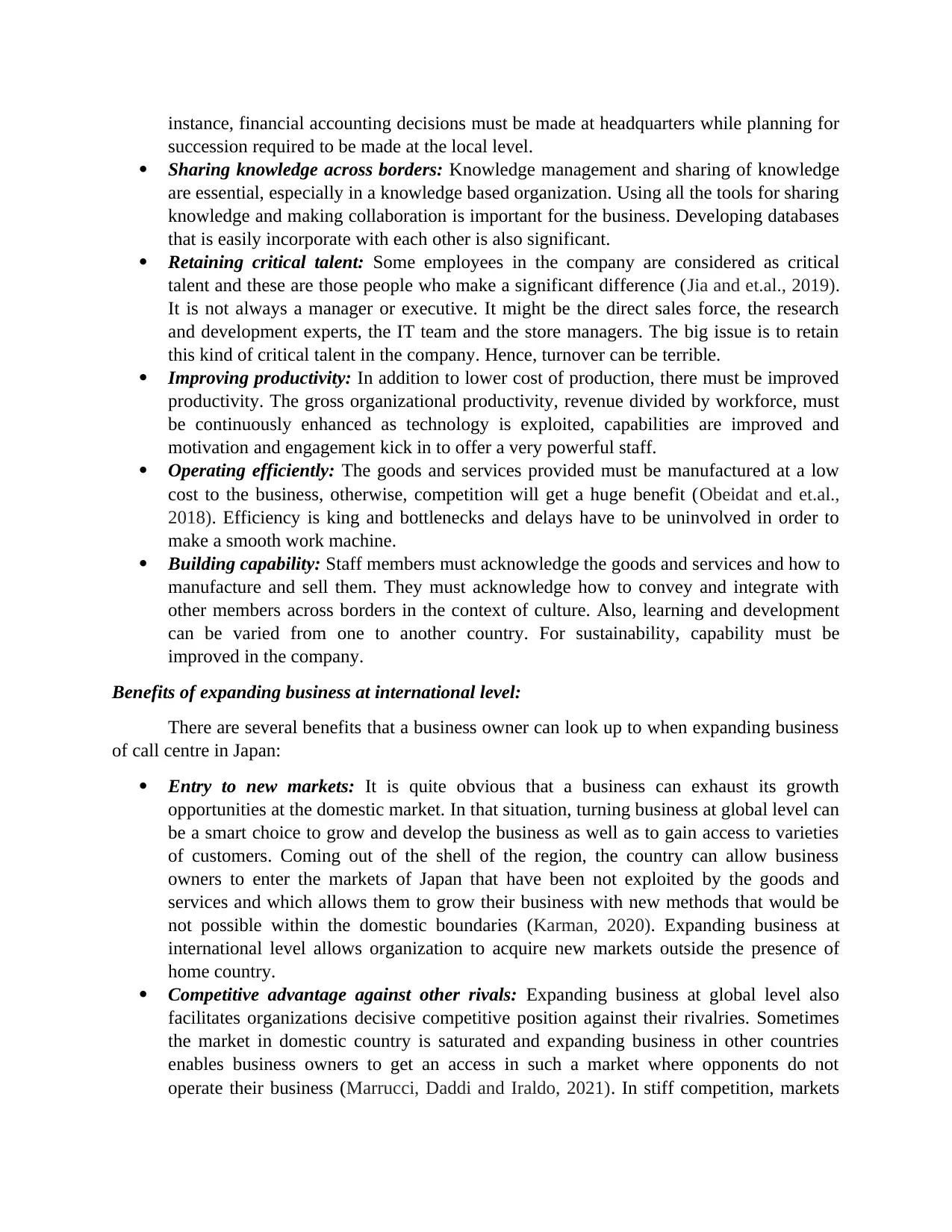
instance, financial accounting decisions must be made at headquarters while planning for
succession required to be made at the local level.
Sharing knowledge across borders: Knowledge management and sharing of knowledge
are essential, especially in a knowledge based organization. Using all the tools for sharing
knowledge and making collaboration is important for the business. Developing databases
that is easily incorporate with each other is also significant.
Retaining critical talent: Some employees in the company are considered as critical
talent and these are those people who make a significant difference (Jia and et.al., 2019).
It is not always a manager or executive. It might be the direct sales force, the research
and development experts, the IT team and the store managers. The big issue is to retain
this kind of critical talent in the company. Hence, turnover can be terrible.
Improving productivity: In addition to lower cost of production, there must be improved
productivity. The gross organizational productivity, revenue divided by workforce, must
be continuously enhanced as technology is exploited, capabilities are improved and
motivation and engagement kick in to offer a very powerful staff.
Operating efficiently: The goods and services provided must be manufactured at a low
cost to the business, otherwise, competition will get a huge benefit (Obeidat and et.al.,
2018). Efficiency is king and bottlenecks and delays have to be uninvolved in order to
make a smooth work machine.
Building capability: Staff members must acknowledge the goods and services and how to
manufacture and sell them. They must acknowledge how to convey and integrate with
other members across borders in the context of culture. Also, learning and development
can be varied from one to another country. For sustainability, capability must be
improved in the company.
Benefits of expanding business at international level:
There are several benefits that a business owner can look up to when expanding business
of call centre in Japan:
Entry to new markets: It is quite obvious that a business can exhaust its growth
opportunities at the domestic market. In that situation, turning business at global level can
be a smart choice to grow and develop the business as well as to gain access to varieties
of customers. Coming out of the shell of the region, the country can allow business
owners to enter the markets of Japan that have been not exploited by the goods and
services and which allows them to grow their business with new methods that would be
not possible within the domestic boundaries (Karman, 2020). Expanding business at
international level allows organization to acquire new markets outside the presence of
home country.
Competitive advantage against other rivals: Expanding business at global level also
facilitates organizations decisive competitive position against their rivalries. Sometimes
the market in domestic country is saturated and expanding business in other countries
enables business owners to get an access in such a market where opponents do not
operate their business (Marrucci, Daddi and Iraldo, 2021). In stiff competition, markets
succession required to be made at the local level.
Sharing knowledge across borders: Knowledge management and sharing of knowledge
are essential, especially in a knowledge based organization. Using all the tools for sharing
knowledge and making collaboration is important for the business. Developing databases
that is easily incorporate with each other is also significant.
Retaining critical talent: Some employees in the company are considered as critical
talent and these are those people who make a significant difference (Jia and et.al., 2019).
It is not always a manager or executive. It might be the direct sales force, the research
and development experts, the IT team and the store managers. The big issue is to retain
this kind of critical talent in the company. Hence, turnover can be terrible.
Improving productivity: In addition to lower cost of production, there must be improved
productivity. The gross organizational productivity, revenue divided by workforce, must
be continuously enhanced as technology is exploited, capabilities are improved and
motivation and engagement kick in to offer a very powerful staff.
Operating efficiently: The goods and services provided must be manufactured at a low
cost to the business, otherwise, competition will get a huge benefit (Obeidat and et.al.,
2018). Efficiency is king and bottlenecks and delays have to be uninvolved in order to
make a smooth work machine.
Building capability: Staff members must acknowledge the goods and services and how to
manufacture and sell them. They must acknowledge how to convey and integrate with
other members across borders in the context of culture. Also, learning and development
can be varied from one to another country. For sustainability, capability must be
improved in the company.
Benefits of expanding business at international level:
There are several benefits that a business owner can look up to when expanding business
of call centre in Japan:
Entry to new markets: It is quite obvious that a business can exhaust its growth
opportunities at the domestic market. In that situation, turning business at global level can
be a smart choice to grow and develop the business as well as to gain access to varieties
of customers. Coming out of the shell of the region, the country can allow business
owners to enter the markets of Japan that have been not exploited by the goods and
services and which allows them to grow their business with new methods that would be
not possible within the domestic boundaries (Karman, 2020). Expanding business at
international level allows organization to acquire new markets outside the presence of
home country.
Competitive advantage against other rivals: Expanding business at global level also
facilitates organizations decisive competitive position against their rivalries. Sometimes
the market in domestic country is saturated and expanding business in other countries
enables business owners to get an access in such a market where opponents do not
operate their business (Marrucci, Daddi and Iraldo, 2021). In stiff competition, markets
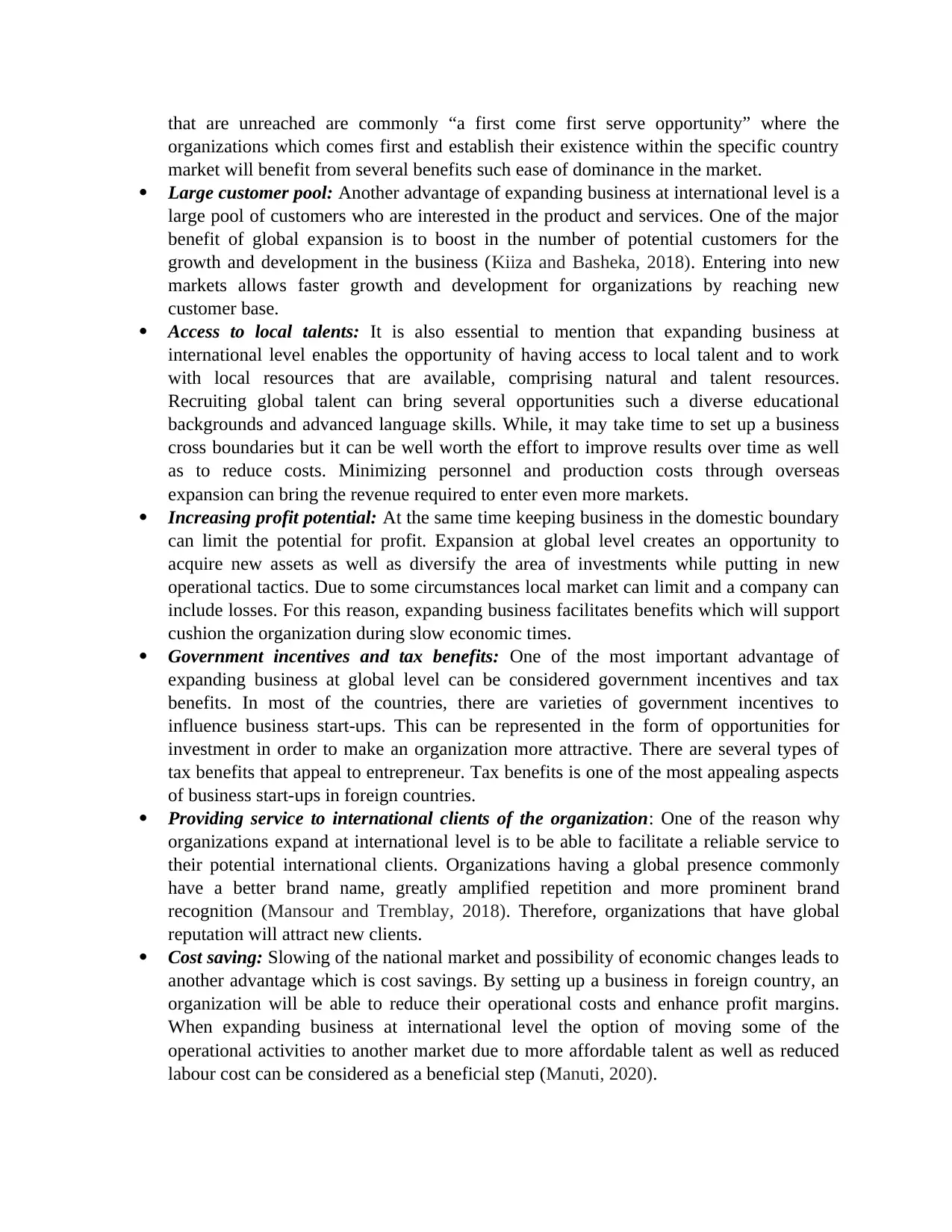
that are unreached are commonly “a first come first serve opportunity” where the
organizations which comes first and establish their existence within the specific country
market will benefit from several benefits such ease of dominance in the market.
Large customer pool: Another advantage of expanding business at international level is a
large pool of customers who are interested in the product and services. One of the major
benefit of global expansion is to boost in the number of potential customers for the
growth and development in the business (Kiiza and Basheka, 2018). Entering into new
markets allows faster growth and development for organizations by reaching new
customer base.
Access to local talents: It is also essential to mention that expanding business at
international level enables the opportunity of having access to local talent and to work
with local resources that are available, comprising natural and talent resources.
Recruiting global talent can bring several opportunities such a diverse educational
backgrounds and advanced language skills. While, it may take time to set up a business
cross boundaries but it can be well worth the effort to improve results over time as well
as to reduce costs. Minimizing personnel and production costs through overseas
expansion can bring the revenue required to enter even more markets.
Increasing profit potential: At the same time keeping business in the domestic boundary
can limit the potential for profit. Expansion at global level creates an opportunity to
acquire new assets as well as diversify the area of investments while putting in new
operational tactics. Due to some circumstances local market can limit and a company can
include losses. For this reason, expanding business facilitates benefits which will support
cushion the organization during slow economic times.
Government incentives and tax benefits: One of the most important advantage of
expanding business at global level can be considered government incentives and tax
benefits. In most of the countries, there are varieties of government incentives to
influence business start-ups. This can be represented in the form of opportunities for
investment in order to make an organization more attractive. There are several types of
tax benefits that appeal to entrepreneur. Tax benefits is one of the most appealing aspects
of business start-ups in foreign countries.
Providing service to international clients of the organization: One of the reason why
organizations expand at international level is to be able to facilitate a reliable service to
their potential international clients. Organizations having a global presence commonly
have a better brand name, greatly amplified repetition and more prominent brand
recognition (Mansour and Tremblay, 2018). Therefore, organizations that have global
reputation will attract new clients.
Cost saving: Slowing of the national market and possibility of economic changes leads to
another advantage which is cost savings. By setting up a business in foreign country, an
organization will be able to reduce their operational costs and enhance profit margins.
When expanding business at international level the option of moving some of the
operational activities to another market due to more affordable talent as well as reduced
labour cost can be considered as a beneficial step (Manuti, 2020).
organizations which comes first and establish their existence within the specific country
market will benefit from several benefits such ease of dominance in the market.
Large customer pool: Another advantage of expanding business at international level is a
large pool of customers who are interested in the product and services. One of the major
benefit of global expansion is to boost in the number of potential customers for the
growth and development in the business (Kiiza and Basheka, 2018). Entering into new
markets allows faster growth and development for organizations by reaching new
customer base.
Access to local talents: It is also essential to mention that expanding business at
international level enables the opportunity of having access to local talent and to work
with local resources that are available, comprising natural and talent resources.
Recruiting global talent can bring several opportunities such a diverse educational
backgrounds and advanced language skills. While, it may take time to set up a business
cross boundaries but it can be well worth the effort to improve results over time as well
as to reduce costs. Minimizing personnel and production costs through overseas
expansion can bring the revenue required to enter even more markets.
Increasing profit potential: At the same time keeping business in the domestic boundary
can limit the potential for profit. Expansion at global level creates an opportunity to
acquire new assets as well as diversify the area of investments while putting in new
operational tactics. Due to some circumstances local market can limit and a company can
include losses. For this reason, expanding business facilitates benefits which will support
cushion the organization during slow economic times.
Government incentives and tax benefits: One of the most important advantage of
expanding business at global level can be considered government incentives and tax
benefits. In most of the countries, there are varieties of government incentives to
influence business start-ups. This can be represented in the form of opportunities for
investment in order to make an organization more attractive. There are several types of
tax benefits that appeal to entrepreneur. Tax benefits is one of the most appealing aspects
of business start-ups in foreign countries.
Providing service to international clients of the organization: One of the reason why
organizations expand at international level is to be able to facilitate a reliable service to
their potential international clients. Organizations having a global presence commonly
have a better brand name, greatly amplified repetition and more prominent brand
recognition (Mansour and Tremblay, 2018). Therefore, organizations that have global
reputation will attract new clients.
Cost saving: Slowing of the national market and possibility of economic changes leads to
another advantage which is cost savings. By setting up a business in foreign country, an
organization will be able to reduce their operational costs and enhance profit margins.
When expanding business at international level the option of moving some of the
operational activities to another market due to more affordable talent as well as reduced
labour cost can be considered as a beneficial step (Manuti, 2020).
⊘ This is a preview!⊘
Do you want full access?
Subscribe today to unlock all pages.

Trusted by 1+ million students worldwide
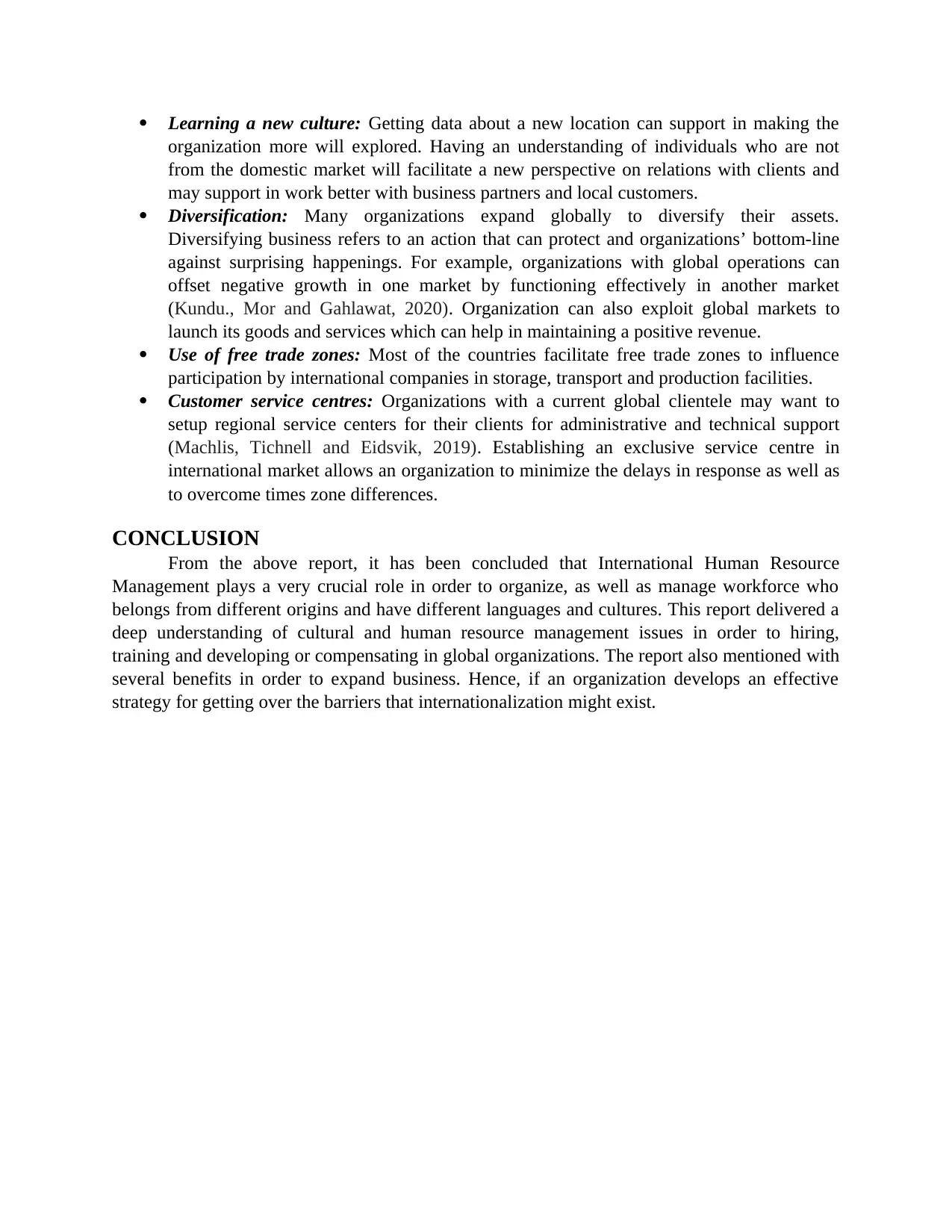
Learning a new culture: Getting data about a new location can support in making the
organization more will explored. Having an understanding of individuals who are not
from the domestic market will facilitate a new perspective on relations with clients and
may support in work better with business partners and local customers.
Diversification: Many organizations expand globally to diversify their assets.
Diversifying business refers to an action that can protect and organizations’ bottom-line
against surprising happenings. For example, organizations with global operations can
offset negative growth in one market by functioning effectively in another market
(Kundu., Mor and Gahlawat, 2020). Organization can also exploit global markets to
launch its goods and services which can help in maintaining a positive revenue.
Use of free trade zones: Most of the countries facilitate free trade zones to influence
participation by international companies in storage, transport and production facilities.
Customer service centres: Organizations with a current global clientele may want to
setup regional service centers for their clients for administrative and technical support
(Machlis, Tichnell and Eidsvik, 2019). Establishing an exclusive service centre in
international market allows an organization to minimize the delays in response as well as
to overcome times zone differences.
CONCLUSION
From the above report, it has been concluded that International Human Resource
Management plays a very crucial role in order to organize, as well as manage workforce who
belongs from different origins and have different languages and cultures. This report delivered a
deep understanding of cultural and human resource management issues in order to hiring,
training and developing or compensating in global organizations. The report also mentioned with
several benefits in order to expand business. Hence, if an organization develops an effective
strategy for getting over the barriers that internationalization might exist.
organization more will explored. Having an understanding of individuals who are not
from the domestic market will facilitate a new perspective on relations with clients and
may support in work better with business partners and local customers.
Diversification: Many organizations expand globally to diversify their assets.
Diversifying business refers to an action that can protect and organizations’ bottom-line
against surprising happenings. For example, organizations with global operations can
offset negative growth in one market by functioning effectively in another market
(Kundu., Mor and Gahlawat, 2020). Organization can also exploit global markets to
launch its goods and services which can help in maintaining a positive revenue.
Use of free trade zones: Most of the countries facilitate free trade zones to influence
participation by international companies in storage, transport and production facilities.
Customer service centres: Organizations with a current global clientele may want to
setup regional service centers for their clients for administrative and technical support
(Machlis, Tichnell and Eidsvik, 2019). Establishing an exclusive service centre in
international market allows an organization to minimize the delays in response as well as
to overcome times zone differences.
CONCLUSION
From the above report, it has been concluded that International Human Resource
Management plays a very crucial role in order to organize, as well as manage workforce who
belongs from different origins and have different languages and cultures. This report delivered a
deep understanding of cultural and human resource management issues in order to hiring,
training and developing or compensating in global organizations. The report also mentioned with
several benefits in order to expand business. Hence, if an organization develops an effective
strategy for getting over the barriers that internationalization might exist.
Paraphrase This Document
Need a fresh take? Get an instant paraphrase of this document with our AI Paraphraser
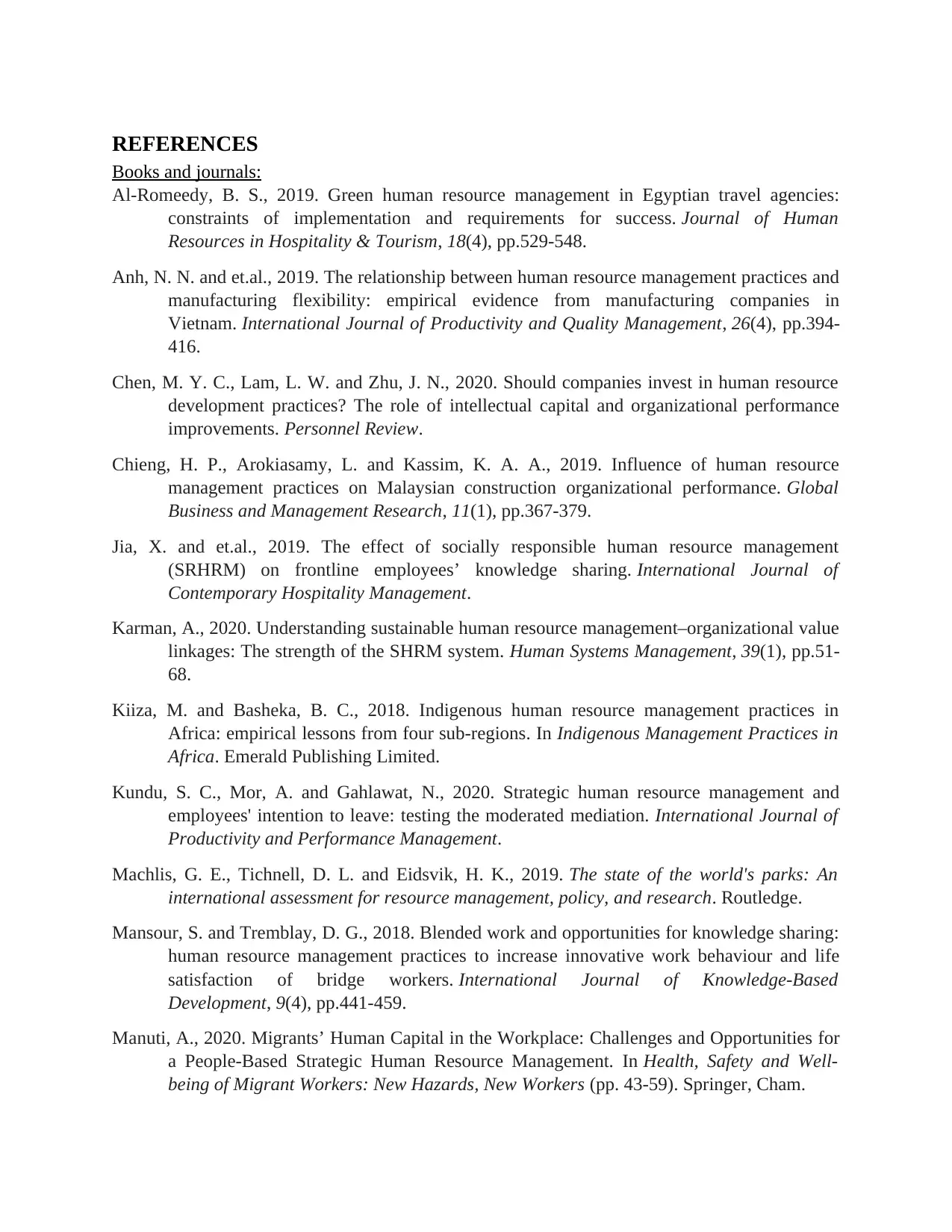
REFERENCES
Books and journals:
Al-Romeedy, B. S., 2019. Green human resource management in Egyptian travel agencies:
constraints of implementation and requirements for success. Journal of Human
Resources in Hospitality & Tourism, 18(4), pp.529-548.
Anh, N. N. and et.al., 2019. The relationship between human resource management practices and
manufacturing flexibility: empirical evidence from manufacturing companies in
Vietnam. International Journal of Productivity and Quality Management, 26(4), pp.394-
416.
Chen, M. Y. C., Lam, L. W. and Zhu, J. N., 2020. Should companies invest in human resource
development practices? The role of intellectual capital and organizational performance
improvements. Personnel Review.
Chieng, H. P., Arokiasamy, L. and Kassim, K. A. A., 2019. Influence of human resource
management practices on Malaysian construction organizational performance. Global
Business and Management Research, 11(1), pp.367-379.
Jia, X. and et.al., 2019. The effect of socially responsible human resource management
(SRHRM) on frontline employees’ knowledge sharing. International Journal of
Contemporary Hospitality Management.
Karman, A., 2020. Understanding sustainable human resource management–organizational value
linkages: The strength of the SHRM system. Human Systems Management, 39(1), pp.51-
68.
Kiiza, M. and Basheka, B. C., 2018. Indigenous human resource management practices in
Africa: empirical lessons from four sub-regions. In Indigenous Management Practices in
Africa. Emerald Publishing Limited.
Kundu, S. C., Mor, A. and Gahlawat, N., 2020. Strategic human resource management and
employees' intention to leave: testing the moderated mediation. International Journal of
Productivity and Performance Management.
Machlis, G. E., Tichnell, D. L. and Eidsvik, H. K., 2019. The state of the world's parks: An
international assessment for resource management, policy, and research. Routledge.
Mansour, S. and Tremblay, D. G., 2018. Blended work and opportunities for knowledge sharing:
human resource management practices to increase innovative work behaviour and life
satisfaction of bridge workers. International Journal of Knowledge-Based
Development, 9(4), pp.441-459.
Manuti, A., 2020. Migrants’ Human Capital in the Workplace: Challenges and Opportunities for
a People-Based Strategic Human Resource Management. In Health, Safety and Well-
being of Migrant Workers: New Hazards, New Workers (pp. 43-59). Springer, Cham.
Books and journals:
Al-Romeedy, B. S., 2019. Green human resource management in Egyptian travel agencies:
constraints of implementation and requirements for success. Journal of Human
Resources in Hospitality & Tourism, 18(4), pp.529-548.
Anh, N. N. and et.al., 2019. The relationship between human resource management practices and
manufacturing flexibility: empirical evidence from manufacturing companies in
Vietnam. International Journal of Productivity and Quality Management, 26(4), pp.394-
416.
Chen, M. Y. C., Lam, L. W. and Zhu, J. N., 2020. Should companies invest in human resource
development practices? The role of intellectual capital and organizational performance
improvements. Personnel Review.
Chieng, H. P., Arokiasamy, L. and Kassim, K. A. A., 2019. Influence of human resource
management practices on Malaysian construction organizational performance. Global
Business and Management Research, 11(1), pp.367-379.
Jia, X. and et.al., 2019. The effect of socially responsible human resource management
(SRHRM) on frontline employees’ knowledge sharing. International Journal of
Contemporary Hospitality Management.
Karman, A., 2020. Understanding sustainable human resource management–organizational value
linkages: The strength of the SHRM system. Human Systems Management, 39(1), pp.51-
68.
Kiiza, M. and Basheka, B. C., 2018. Indigenous human resource management practices in
Africa: empirical lessons from four sub-regions. In Indigenous Management Practices in
Africa. Emerald Publishing Limited.
Kundu, S. C., Mor, A. and Gahlawat, N., 2020. Strategic human resource management and
employees' intention to leave: testing the moderated mediation. International Journal of
Productivity and Performance Management.
Machlis, G. E., Tichnell, D. L. and Eidsvik, H. K., 2019. The state of the world's parks: An
international assessment for resource management, policy, and research. Routledge.
Mansour, S. and Tremblay, D. G., 2018. Blended work and opportunities for knowledge sharing:
human resource management practices to increase innovative work behaviour and life
satisfaction of bridge workers. International Journal of Knowledge-Based
Development, 9(4), pp.441-459.
Manuti, A., 2020. Migrants’ Human Capital in the Workplace: Challenges and Opportunities for
a People-Based Strategic Human Resource Management. In Health, Safety and Well-
being of Migrant Workers: New Hazards, New Workers (pp. 43-59). Springer, Cham.
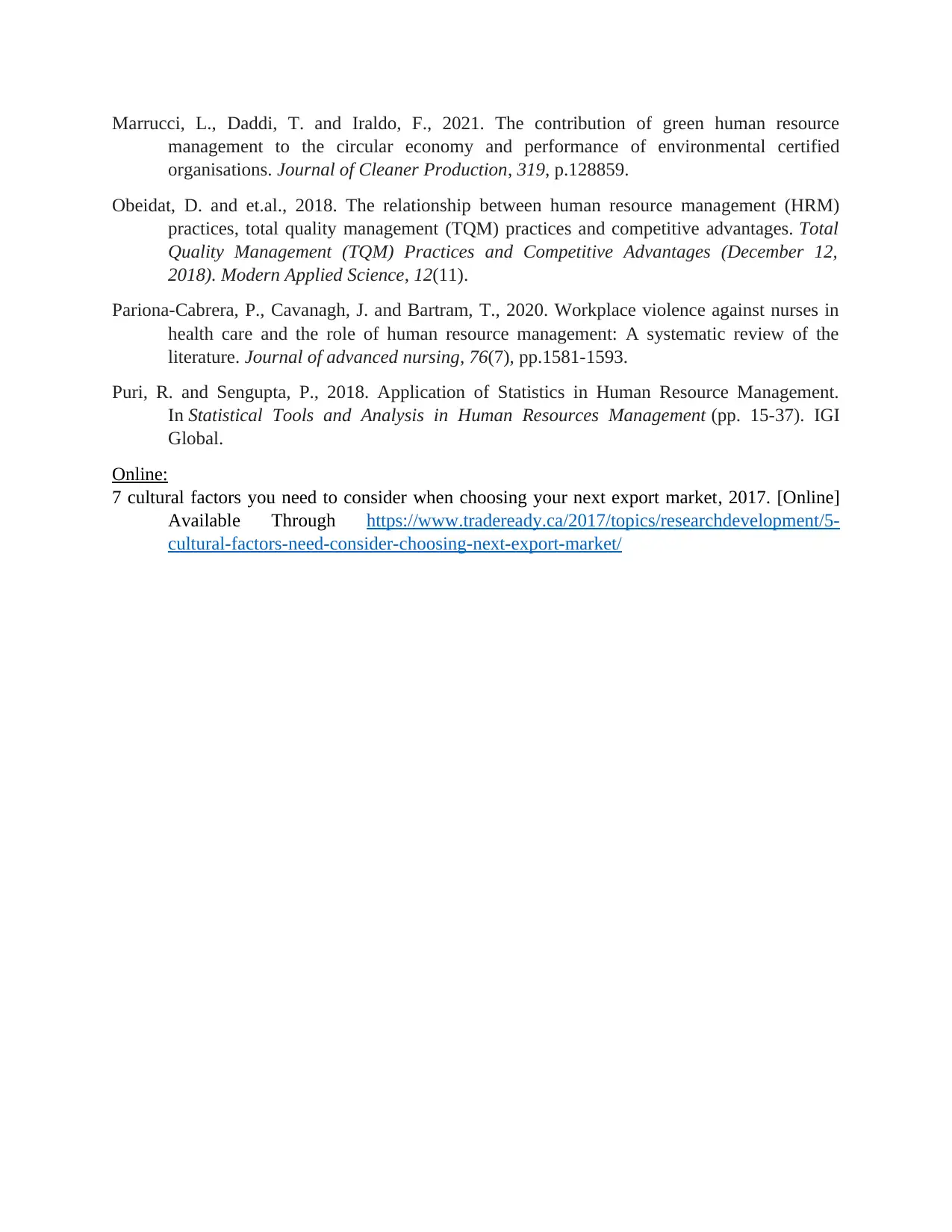
Marrucci, L., Daddi, T. and Iraldo, F., 2021. The contribution of green human resource
management to the circular economy and performance of environmental certified
organisations. Journal of Cleaner Production, 319, p.128859.
Obeidat, D. and et.al., 2018. The relationship between human resource management (HRM)
practices, total quality management (TQM) practices and competitive advantages. Total
Quality Management (TQM) Practices and Competitive Advantages (December 12,
2018). Modern Applied Science, 12(11).
Pariona‐Cabrera, P., Cavanagh, J. and Bartram, T., 2020. Workplace violence against nurses in
health care and the role of human resource management: A systematic review of the
literature. Journal of advanced nursing, 76(7), pp.1581-1593.
Puri, R. and Sengupta, P., 2018. Application of Statistics in Human Resource Management.
In Statistical Tools and Analysis in Human Resources Management (pp. 15-37). IGI
Global.
Online:
7 cultural factors you need to consider when choosing your next export market, 2017. [Online]
Available Through https://www.tradeready.ca/2017/topics/researchdevelopment/5-
cultural-factors-need-consider-choosing-next-export-market/
management to the circular economy and performance of environmental certified
organisations. Journal of Cleaner Production, 319, p.128859.
Obeidat, D. and et.al., 2018. The relationship between human resource management (HRM)
practices, total quality management (TQM) practices and competitive advantages. Total
Quality Management (TQM) Practices and Competitive Advantages (December 12,
2018). Modern Applied Science, 12(11).
Pariona‐Cabrera, P., Cavanagh, J. and Bartram, T., 2020. Workplace violence against nurses in
health care and the role of human resource management: A systematic review of the
literature. Journal of advanced nursing, 76(7), pp.1581-1593.
Puri, R. and Sengupta, P., 2018. Application of Statistics in Human Resource Management.
In Statistical Tools and Analysis in Human Resources Management (pp. 15-37). IGI
Global.
Online:
7 cultural factors you need to consider when choosing your next export market, 2017. [Online]
Available Through https://www.tradeready.ca/2017/topics/researchdevelopment/5-
cultural-factors-need-consider-choosing-next-export-market/
⊘ This is a preview!⊘
Do you want full access?
Subscribe today to unlock all pages.

Trusted by 1+ million students worldwide
1 out of 9
Related Documents
Your All-in-One AI-Powered Toolkit for Academic Success.
+13062052269
info@desklib.com
Available 24*7 on WhatsApp / Email
![[object Object]](/_next/static/media/star-bottom.7253800d.svg)
Unlock your academic potential
Copyright © 2020–2026 A2Z Services. All Rights Reserved. Developed and managed by ZUCOL.





